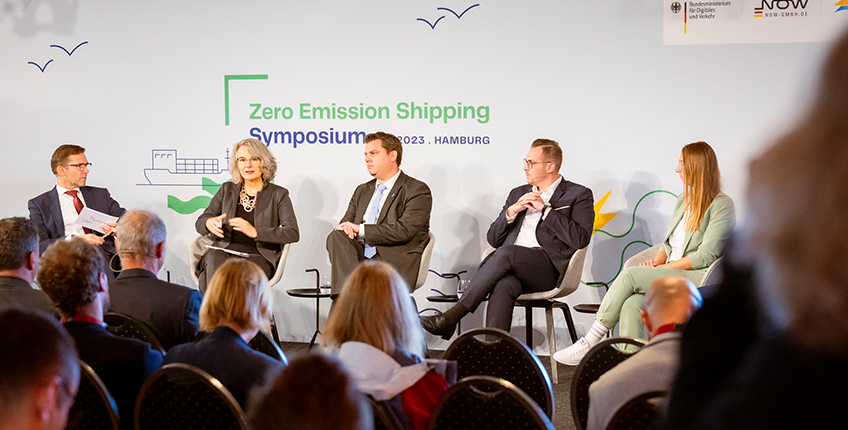BMDV announces National Action Plan for Climate-friendly Shipping
Germany’s maritime community meets in Hamburg: NOW GmbH – this time together with the Maritime Platform – hosts the Zero Emission Shipping Symposium (ZESS) for the fifth time on 10 October 2023. The focus of the event was on environmentally and climate-friendly alternatives to conventional ship propulsion systems and fuels. Topics presented included the initial results of a study on the potential of bunkering infrastructures commissioned by NOW GmbH. State Secretary Susanne Henckel also announced the commencement of the development of a National Action Plan for Climate-Friendly Shipping: this will serve as Germany’s roadmap for the energy transition on the water.
Diverse alternatives to green transport on water
The framework conditions at international and European level are setting the direction: By the middle of the 21st century, shipping is to become climate-neutral by switching to alternative propulsion systems and sustainable fuels. It is already becoming apparent that there will not be one single alternative to conventional ship propulsion systems and fuels, but that a wide spectrum of technology options will be required to meet the respective requirements of cargo and passenger ships. Pioneers of climate-friendly shipping presented themselves at the ZESS and used practical examples to show how the transformation towards climate neutrality can succeed.
Susanne Henckel, State Secretary at the Federal Ministry for Digital and Transport Affairs, opened the ZESS and emphasised the federal government’s support for climate-friendly shipping: “In July, the states resolved to make maritime shipping climate-neutral by 2050, also due to the commitment of the BMDV at the international level, and were also able to back this up with ambitious interim targets. This is a huge success, especially in view of the various national interests, which is also due to the commitment of Germany and the EU. Now we have to translate the goals into strategic measures and fields of action at the national level and fill them with life. To this end, we will commence coordination for a National Action Plan before the end of the year.”
NOW CEO Kurt-Christoph von Knobelsdorff: “The need for an overall concept for sustainable alternative propulsion systems and fuel infrastructures that are open to all technologies is very high and the maritime industry has already demonstrated its willingness to boldly move forward here. Now, this innovative strength is being channelled into a political strategy. I am pleased that NOW GmbH can support here with its expertise for climate-friendly mobility.”
Rolf Stiefel, Chairman of the Board of the Maritime Platform: “The approximately one hundred national and international members of the Maritime Platform from companies, ports, associations and initiatives are working tirelessly every day towards the transformation of shipping towards lower emissions and higher climate protection. For the different shipping segments – from inland shipping to intercontinental maritime transport – various adapted solutions are currently being developed to achieve these environmental goals. The political framework conditions to quickly implement and provide the necessary infrastructure, from bunkering ships to electric shore-side connections and the legal approval requirements, are of key importance here.”
The German government is already supporting shipping on its way towards the net-zero emissions target with various funding programmes:
- With the guidelines for the promotion of sustainable modernisation of coastal and inland vessels, the BMDV has developed funding programmes for cross-technology investments in fleet modernisation for both sectors in order to contribute to air pollution control and climate protection.
- In addition, the BMDV supports the use of innovative technologies for environmentally friendly on-board and mobile shore-side power supply for seagoing and inland vessels through the BordstromTech funding programme.
- The National Innovation Programme Hydrogen and Fuel Cell Technology (NIP) supports the development and demonstration of fuel cells in maritime applications – both in inland and seagoing shipping.
- The first plug-in hybrid and fully electric excursion ships and harbour ferries have already been implemented in municipal use via the electric mobility funding programme. The first investments in LNG as a bridge fuel for seagoing vessels were also made on the basis of BMDV funding.
- Furthermore, the BMDV has published a call for funding for the development of climate-friendly maritime fuels as part of the funding guideline for the development of renewable fuels (“Förderrichtlinie für die Entwicklung regenerativer Kraftstoffe”). The submissions are currently being evaluated.
Stakeholder participation as a key to the National Action Plan
The ZESS 2023 clearly highlighted the great willingness and the multifaceted possibilities to tackle the opportunities and challenges of a climate-friendly transformation of shipping. There is a great need for the industry to exchange ideas with each other and with policymakers, for which established formats such as the ZESS remain essential. This broad stakeholder participation will feed into the development of the National Action Plan for Climate-friendly Shipping.
Photo: NOW, Franz Josef – Berlin


